Free Grazing & Law Breaking: Cliven Bundy’s Stand against the Government
Here in America, we love our outlaws. We idolize them, romanticize them, and keep them alive in songs, folklore, stories, and movies. What is it that is so alluring about them? Perhaps it is for how they are remembered in myth as being Robin Hood type figures. Or maybe it is their bravado to stick a finger in the eye of the government, their courage and daring against all odds, or even their arrogance to attempt such feats that captures our imagination, but history remembers them differently. Outlaws were often murderers, thieves, gamblers, and criminals who did very little for the common or local folk. While they might be charming in movies and we can admire them from afar, none of us likes a law breaker. We all inherently understand this when we are the victim of law breakers, even when the crime is as slight as someone cutting in front of us in line, or getting free grazing when everyone else has to pay. They go against the grain of civil society, they break the rules and while they may have stamina, may be fighters, and may even stand on principle, at the end of the day, they are still law breakers.
In a small corner of Nevada in the little town of Bunkerville, a modern day outlaw is waging his own war against the government. Cliven Bundy is a rancher born into a long line of Mormon ranchers who settled along the Virgin River. According to him, his family has been ranching in Bunkerville for 130 years. I have met his relatives Orvel and Clay Bundy and they are good, solid, hard-working people. I was particularly impressed with Orvel when I met and talked with him in 2012. When I asked him about Cliven he replied, “A man’s got to make a living.” He let that phrase hang in the air. I know that Orvel has had his own battles with the BLM. As land management and stakeholders go, it is par for the course, but he has found a way to work within the limits of the law. Cliven, on the other hand, has taken a different approach working outside of the law, and now the Pied Piper has come to collect. As Mattie Ross said in True Grit, “You must pay for everything in this world one way or another.”
Some mistakenly believe that this is an environmental issue, or a liberty issue, or a property rights issue, but the facts will reveal that it is a legal issue. Cliven Bundy has been illegally grazing his cattle on federal land and not paying his grazing fees for nearly 20 years. Around 1993 the BLM started revising grazing permits to provide for the protection of the desert tortoise. Mr. Bundy didn’t like the change and so he stopped paying his grazing fees. It was at the moment that he stopped paying his fees that he gave up any legal standing he had to graze on public lands or to seek compensation. In response, the BLM cancelled his permit and would no longer grant him anymore grazing permits on BLM land. Around that time, there was a land swap between Nevada and the Federal Government where Nevada offered to buy the grazing allotments to set up a preserve to protect the desert tortoise in exchange for desert tortoise habitat that they could destroy for development. At the time, all ranchers who had allotments in the area were offered the chance to sell their allotments and did to the tune of roughly $5 million dollars. Mr. Bundy was not given the option of a buy-out for his allotment because he had forfeited his rights to it when he stopped paying his fees. Therefore, the permit was sold to Nevada for $375,000.00. Mr. Bundy now claims they are taking away his right to make a living, but as will be shown, he forfeited it all on his own.
When the United States was promoting westward expansion and homesteading, the lands were quickly over-grazed due to a lack of understanding of the arid west’s fragile ecosystem. According to the Encyclopedia of the Great Plains, “After decades of rangeland deterioration, conflicts between cattle ranchers and migratory sheepherders, jurisdictional disputes, and states’ rights debates – and in response to the pleas of western ranchers, Congress passed the Taylor Grazing Act of 1934 which effectively ended free access to the range.”
What was happening in the West prior to the Taylor Grazing Act was an economic theory coined the Tragedy of the Commons. It states that individuals acting independently and rationally according to each one’s self-interest, behave contrary to the whole group’s long-term best interests by depleting the common or shared resource. In other words, when a common good is “free,” people will selfishly use it until it is gone because they cannot self regulate, and those who try, quickly give up when no one else does. Regulating grazing ensured that the vegetation would regenerate and continue to provide productive land, further ensuring that grazing would continue into the future.
The purpose of the act was to stop injury to the public lands; provide for their orderly use, improvement, and development; and stabilize the livestock industry dependent on the public range. The new law effectively closed the rangelands to homesteading. The act established grazing districts on the vacant, unappropriated and unreserved lands of the public domain and established grazing advisory boards, primarily composed of livestock owners. Board duties included the allocation of permits and the determination of boundaries, seasons of use, and the carrying capacity of the range (1).
The new permit system granted grazing privileges (not rights) by preference to ranchers who had actually used a grazing district’s land during a priority period before 1934. Owners of land or water rights who could support livestock on base ranches during seasons when herds were not on the grazing districts were favored; those without property were not. Technically, the grazing permit is a revocable license under the law, not creating any right, title, interest, or estate in or to the land. The act also created the Grazing Service, but inadequate funding prevented effective observation and evaluation of range use partly because grazing fees were never raised to adequately fund the Service. Permitted animal unit months were set at preexisting 1934 stock levels. Efforts to reduce stock levels inevitably failed. The Grazing Service and General Land Office were then consolidated in 1946 to form the Bureau of Land Management (1).
According to the BLM, “The unregulated grazing that took place before enactment of the Taylor Grazing Act caused unintended damage to soil, plants, streams, and springs. As a result, grazing management was initially designed to increase productivity and reduce soil erosion by controlling grazing through both fencing and water projects and by conducting forage surveys to balance forage demands with the land’s productivity (“carrying capacity”). These initial improvements in livestock management, which arrested the degradation of public rangelands while improving watersheds, were appropriate for the times. But by the 1960s and 1970s, public appreciation for public lands and expectations for their management rose to a new level, as made clear by congressional passage of such laws as the National Environmental Policy Act of 1969, the Endangered Species Act of 1973, and the Federal Land Policy and Management Act of 1976. Consequently, the BLM moved from managing grazing in general to better management or protection of specific rangeland resources, such as riparian areas, threatened and endangered species, sensitive plant species, and cultural or historical objects. Consistent with this enhanced role, the Bureau developed or modified the terms and conditions of grazing permits and leases and implemented new range improvement projects to address these specific resource issues, promoting continued improvement of public rangeland conditions (2).”
As stated above, grazing permits do not equate to grazing or property rights and must be weighed in light of new laws, competing interests for present and future generations, and can be altered and/or revoked in lieu of changing circumstances. Those changing circumstances came in the early 1990s when the desert tortoise was listed as endangered. In response, the BLM modified Cliven Bundy’s Bunkerville allotment to protect the tortoise. As you will remember, along with the Taylor Grazing Act, the BLM is also beholden to the Endangered Species Act. By law, they are required to protect species, as well as manage grazing allotments. They were doing their job. Mr. Bundy, however, didn’t like the grazing permit change and rejected the new grazing permit on grounds that he did not recognize the law or the legal authority of the BLM to change the permit. He stopped paying his grazing fees and continued to allow his cattle to not only graze on the Bunkerville allotment, but allowed them to graze on federal land as far as the Lake Mead Recreation Area.
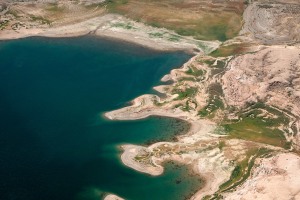
According to the BLM Northeast Clark County Cattle Trespass timeline, in 1997, in accordance with the Desert Tortoise Recovery Plan and the Biological Opinion released by the U.S. Fish and Wildlife Service, active grazing permits in tortoise habitat were purchased by Clark County under the Clark County Multi-Species Habitat Conservation Program. Mr. Bundy rejected a tentative proposal to compensate him for any stockwater rights or range improvements he might have in his former allotment. It should be noted that all other ranchers who grazed in the Bunkerville allotment did accept the compensation and have been complying with federal law and the agencies enforcing it and are actually supporting the BLM. He is the only one defiantly disobeying the law. Not only it is not fair to the public, it is not fair to ranchers who are paying their fees and abiding by the law. In 1998, the United States filed a civil complaint against Mr. Bundy for his continued trespass grazing in the Bunkerville Allotment. The U.S. District Court for the District of Nevada issued an order permanently enjoining Mr. Bundy from grazing cattle on the Bunkerville allotment, ordered him to remove all trespass cattle and set a penalty of $200 per day per animal remaining on the federal range (4).
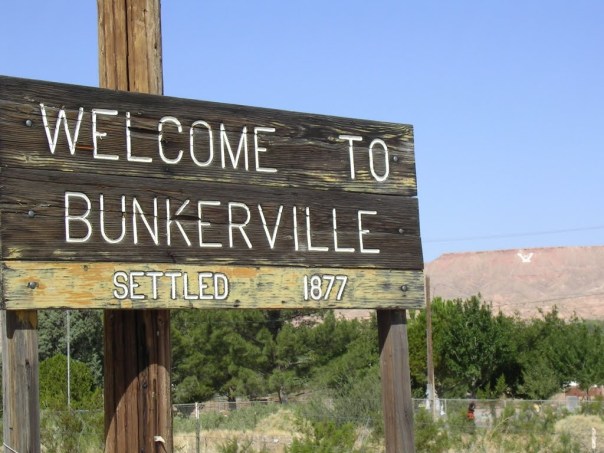
Mr. Bundy has insanely, arrogantly, or in a willful attempt at wishful thinking charged in federal court that the land was not federal land, wherein the court disagreed stating, “the public lands in Nevada are the property of the United States because the United States has held title to those public lands since 1848, when Mexico ceded the land to the United States (5). In 1999, the Ninth Circuit Court of Appeals upheld the District Court’s permanent injunction. When Mr. Bundy failed to remove his livestock as directed by the District Court, the United States filed a motion to enforce the permanent injunction and the District Court ordered Mr. Bundy to pay $1,377 as willful repeated trespass damages and adjusted fines to be consistent with regulatory rates of $45.90 per day for each day Mr. Bundy’s cattle remained on the allotment (4).
In 1999, the Las Vegas Field Office Resource Management Plan designated the Bunkerville allotment as “Closed to Grazing” to protect desert tortoise habitat.
In 2008, the BLM issued a decision to cancel Mr. Bundy’s range improvement authorizations (one range improvement permit and ten cooperative agreements). Mr. Bundy submitted a letter objecting to the action which BLM forwarded to the Interior Board of Land Appeals (IBLA) as an appeal. The IBLA issued a decision affirming the BLM’s cancellation decision on December 22, 2008. In 2011, BLM issued Mr. Bundy a Trespass Notice and Order to Cease and Desist, a Trespass Decision and Order to Remove, and a Notice of Intent to Impound. None of these communications resulted in Mr. Bundy’s voluntary removal of the trespass cattle from the public lands (4).
In May 2012, the United States filed a Complaint seeking declaratory and injunctive relief for Cliven Bundy’s trespass grazing within the Gold Butte area outside the Bunkerville Allotment, including within Lake Mead National Recreation Area. In April 2013, the United States filed a Motion to Enforce the 1998 Permanent Injunction against Cliven Bundy for the Bunkerville Allotment. On July 9, 2013, U.S. District Court of Nevada Judge Lloyd George permanently enjoined Cliven Bundy’s trespass grazing and ordered Cliven Bundy to remove his trespass cattle from public land outside the former Bunkerville Allotment within 45 days, stating that the United States is authorized to seize and impound any cattle that remain in trespass after 45 days. On October 9, 2013, U.S. District Court of Nevada Judge Larry Hicks reiterated that Cliven Bundy is permanently enjoined from grazing the Bunkerville Allotment and has no legal right to graze the federal lands, directed him to remove his trespass cattle from the former Bunkerville Allotment within 45 days, authorized the United States to impound his cattle if he fails to remove them within 45 days or continues to trespass at a future date and directed Mr. Bundy not to physically interfere with an impoundment action (4).
As can be seen, Mr. Bundy has been willfully and arrogantly breaking the law for 20 years. The BLM, the State of Nevada, and the courts have been more than civil and patient, exhausting all legal options trying to do their jobs, to enforce the law, and to resolve the problem peacefully. How Mr. Bundy has been able to ignore and bully not only state but federal agencies is beyond me. It was obviously baffling enough to the Center for Biological Diversity that in April 2012 they filed a 60 day notice of intent to sue the BLM for not doing their job under the Endangered Species Act (6). Now Cliven Bundy is playing the victim, stating that because his family has been ranching and grazing cattle there for 100 or more years, on land that is not his, he is somehow entitled to continue. His stance is not only groundless legally, it is selfish. This one man wrongly believes that his rights supersede the rights of the public and are above the law. But it’s worse than just grazing for free, Mr. Bundy has been grazing his cattle at the public’s expense.

Summer Camps & Education, Wilderness & Open Space Preservation, and Energy Development on Public Lands
We pay tax dollars to have our public lands managed, to have equal access under the law, and to have the law enforced. Mr. Bundy has made his right to graze his cattle more important than all other interests. According to Mary Jo Rugwell, who used to be the BLM Southern Nevada District Manager, “There are hundreds of ranchers that follow the rules. They have grazing permits, pay their fees and manage their cattle as they are supposed to. A lot of other users of public lands also pay for permits and follow their stipulations. It’s just not fair to all of those people that Mr. Bundy does what he wants and doesn’t follow the rules (7).” He, and others like him or supporting him, may not like the Endangered Species Act and may not like federal law or control, but not liking something does not excuse one from breaking the law. Furthermore, not believing in laws does not make them any less real, valid, or enforced. One does not change the law by breaking the law.
Mr. Bundy claims he will do whatever it takes to protect his life, liberty, and property, but none of those things would be in danger if he had actually done the one thing that would have guaranteed them: obeying the law. Clearly he was not willing to do anything. What Mr. Bundy wants is to have his cake and eat it too.
Outlaws are not victims. They are people who have chosen to go outside of the law, to claim that the law does not apply to them, and then seek support and favor from their local community when they are finally challenged and claim that they are fighting for everyone. Many famous outlaws have made such claims and gone down in myth and lore as being for the little guy or for their local communities, but history notes it differently. These were men and women who chose to break the law, not for others, but for their own selfish ends. Though we may be enamored with characters that seem to capture the essence of the wild west, we must remember that this is no longer the wild west and that they were or are outlaws, not victims. Before anyone mistakenly thinks I am comparing Mr. Bundy to those famous outlaws, I will state that the comparison ends at breaking the law. That being said, in an interview with the Moapa Valley Progress, Bundy said that he was “willing to defend his rights at all costs.” When asked whether the matter might come to violence he said, “Why not? I’ve got to protect my property. I have a right to life, liberty and property (7).” I will let you decide how similar he is to outlaws of the past.
While this is an emotional issue for many who know and like Mr. Bundy, at the end of the day, he brought this on himself. If he is a victim of anything, he is a victim of his own arrogance. He willfully broke the law and chose not to work within the confines and limits of it. He has gotten away with it for 20 years. It is time for the BLM to call his bluff and end his free grazing and law breaking now. If he wants to sue Clark County, the state of Nevada, the BLM, the cowboys who will be rounding up his cattle, or anyone else, let him do it. He does not have a case, as has been shown. His argument is weak at best, and absurd at the worst. As the court order states,
“Bundy has produced no valid law or specific facts raising a genuine issue of fact regarding federal ownership or management of public lands in Nevada, or that his cattle have not trespassed on the New Trespass Lands. The United States has established irreparable harm not only through the continuing nature of Bundy’s trespass, but because Bundy’s cattle have caused and continue to cause damage to natural and cultural resources and pose a threat to public safety. The public interest is best served by removal of trespassing cattle that cause harm to natural and cultural resources or pose a threat to the health and safety of members of the public who use the federal lands for recreation. The court finds that the public interest is negatively affected by Bundy’s continuing trespass. Finally, the public interest is served by the enforcement of Congress’ mandate for management of the public rangelands, and by having federal laws and regulations applied to all citizens equally (5).”
The BLM is not the bogeyman. It is not a nameless, faceless organization out to get one man. It is an agency filled with average, everyday people trying to do their job, and managing land for competing interests is a hard one at that. Mr. Bundy has had more than ample time to resolve this issue amicably and reasonably, it is time that he suffer the consequences that anyone else would who blatantly breaks the law. That he is seeking public support on emotional grounds here in southern Utah speaks to his lack of a case. He does not deserve our sympathy; he deserves a reality check that has been a long time coming.
Citations:
(1) Encyclopedia of The Great Plains: http://plainshumanities.unl.edu/encyclopedia/doc/egp.ag.071
(2) BLM Grazing: http://www.blm.gov/wo/st/en/prog/grazing.html
(3) BLM Mission: http://www.blm.gov/wo/st/en/prog/grazing.html
(4) BLM History of Trespass Cattle: http://www.blm.gov/nv/st/en/fo/lvfo/blm_programs/more/trespass_cattle/history_of_trepass.html
(5) Court Orders July 9th & October 9th, 2013: http://www.blm.gov/nv/st/en/fo/lvfo/blm_programs/more/trespass_cattle/court_orders.html
(6) Center for Biological Diversity, Intent to Sue: http://www.biologicaldiversity.org/species/reptiles/desert_tortoise/pdfs/60_day_notice_to_BLM_FWS__HCP_BP_IA.pdf
(7) Moapa Valley Progress, Bunkerville Rancher Holds out against Federal Officials: http://mvprogress.com/2012/04/18/bunkerville-rancher-holds-out-against-federal-officials/
(8) The Spectrum Daily News, Bundy Saddles Up: http://www.thespectrum.com/viewart/20140313/DVTONLINE01/303130030/Mesquite
(9) Las Vegas Review Journal, Emotions Run High as BLM closes 600,000 acres for cattle roundup: http://www.reviewjournal.com/news/emotions-run-high-blm-closes-600000-acres-cattle-roundup
Posted on April 1, 2014, in Nature and the Environment and tagged BLM, Bunkerville, cattle grazing, Center for Biological Diversity, Clark County, Cliven Bundy, desert tortoise, endangered species act, federal law, grazing permits, lake mead recreation area, life liberty and property, multi-use, outlaws, ranching, southern utah, taylor grazing act, trespass cattle. Bookmark the permalink. 152 Comments.
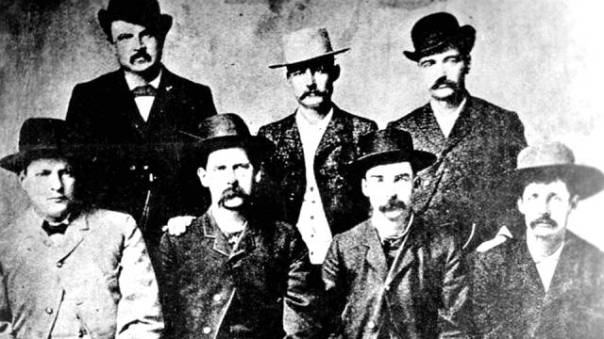
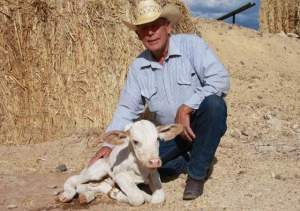

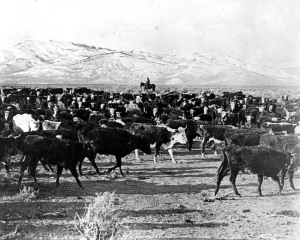
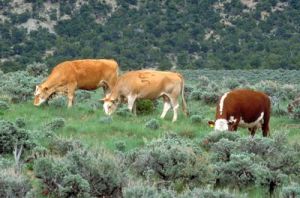

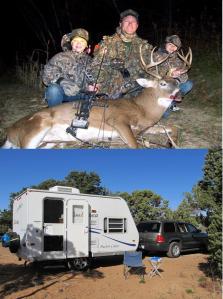

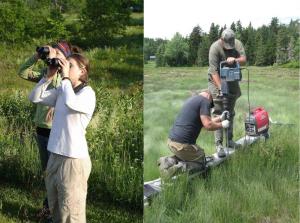

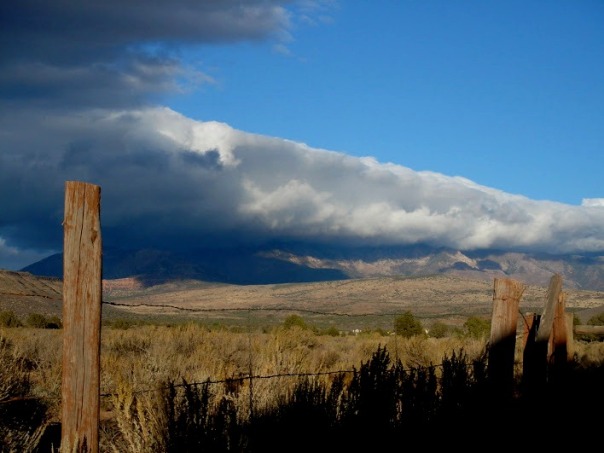
DH, Your attempts to sound reasonable and credible about Mr. Bundy’s situation flew right out the window in your last two paragraphs. First, if he didn’t like the conditions of his grazing permit, then he should have removed his cattle from the allotment. Period. By keeping his cattle on public land and not paying the fees, he was and *still is* stealing! Guess where those cattle went after they were released?
Secondly, like many of his other supporters, you justify the lawless and dangerous behavior by essentially claiming that the federal government is *forcing* Bundy and others to act that way. No one is forcing them to make threats of violence. NO. ONE. He and others like him are responsible for their own behavior. He has lost in court over and over regarding this issue but refuses to accept reality and now the government has come to collect its due. That justifies bloodshed in your eyes??
No, nothing justifies bloodshed, everybody loses when harm is inflicted. Mr. Bundy owns 160 acres of arid desert ground around his ranch house, it won’t sustain the size herd he has and less isn’t enough to operate the way he is a accustomed to operating for the last half a century. It’s my understanding that if he doesn’t have that section to graze his cows on, he’s out of business. If that isn’t the case then I agree, the extremes he is going to don’t make sense. Let me ask you, leaving the obvious conflict of interest with Harry Reid aside, why does the government need to take the whole 130,000 acres? You’re telling me they can’t section off enough for him to run 900 head on and use the rest as the mitigation zone for the solar farm near Laughlin? Why does it have to be everything or nothing at all?
The fact is there is a concerted effort to clear the ranchers from the public land and if there was no underlying issue with the power players involved and the family financial connections to Harry Reid; if it was all about the turtle, then it would still be a bitter pill but the wheel of progress has no conscience, so it is what it is. But there is an underlying rottenness to this — to the tune of millions — but it requires putting generational ranchers out of business and that bothers me.
I hope there is no violence. I hope they come up with some solution that does not include either extreme, i.e., the extinction of the rancher or the force of a gun.
DH, I am a retired 70 year old federal employee. Though I retired after 25 years in the BLM’s Fire/Aviation program I spent the first five years with the BLM as a range conservationist. Before that I worked with USDA in farm and ranch loans. Back in the early 70’s I heard the same statement you make above, “The fact is there is a concerted effort to clear the ranchers from the public land…” I figured that part of the reason people were saying it because of the T & E Species Act. When the Federal Land Management Policy Act came out in 1976 and required the federal land mgt. agencies to expand their management mission from grazing and logging to the other users/disciplines involved in sustained land management practices, your statement became a “war cry!” By the way, a primary reason FLPMA came about – generally poor management practices by land users and government agencies.
By the way, FLPMA increased the work loads of the federal employees without proper budget increases nor clear direction. But I enjoyed my5-6 years working with the ranchers. The generational ranchers, and the hobby ranchers such as doctors and lawyers who liked to have a place to go to on weekends. I admired and still do the generational rancher, but I admire their cowboys even more. Generational ranchers families have worked hard, but they also know the risks they face in their business and if the place has been in the family for generations, they are away that the majority of the land that they graze cattle on does not belong to them. If they have been paying attention, they know that the federal and state governments can make decisions that can negatively impact their livelihood. That’s why they have associations and lobbies. But there is also eminent domain, national security, and a number of other ways that they and the rest of us can wind up with less than what we’d like.
My heroes have always been cowboys. My grandpa trailed cattle from south Texas to Ft. Worth and to Ft. Sill Oklahoma. I feel for the Bundy’s, but the author is correct, he brought this unto himself – big time! I know that much of the independent and rugged individual cowboy myth is just that anymore. Most of the beef we eat is produced in the Midwest not in arid Sonoran, and anymore, even Chihuahuan desert ranges. Climate is changing and I expect even more severe reduction in carrying capacities on western rangelands. I don’t know if the rancher will eventually become extinct – I sincerely hope not. But ranching in many of the western arid rangelands may.
Amen to Al in Arizona. From a lifelong Cattleman.
IF YOU WANT TO PRESERVE LAND – GO LOBBY THE STATE WHERE THAT LAND IS!
This whole – East (NYC) “enslaving”, policing, misrepresenting the western lands is sickening. Its the “united” states – not those states over there OWNS these states over here.
and the soils under them, were not granted by the Constitution to the United States, [[[but were reserved to the States respectively]]]. Secondly, the new States have the same rights, sovereignty, and jurisdiction over this subject as the original States. Thirdly, the right of the United States to the public lands, and the power of Congress to make all needful rules and regulations for the sale and disposition thereof, [[[conferred no power to grant to the plaintiffs the land in controversy]]] in this case. The judgment of the Supreme Court of the [[[State of Alabama is]]], therefore, affirmed.
https://supreme.justia.com/cases/federal/us/44/212/case.html
I’m not following your comment. I cannot lobby my state to protect land that does not belong to it. That would be like Cliven Bundy trying to pay his grazing fees to the state of Nevada. You can’t lobby an entity for something if they have no power or control over it – or you can, but it won’t you get you anywhere.
This article fails to mention Art 1, Sec 8, Clause 17 from the U.S. Constitution. Wonder why?
Why?
Because the Constitution is the basis for Bundy’s defense?
I see no relevance of that section of the constitution to this issue. I assume you believe the Bundy version of it? If you don’t share the Bundy interpretation, please explain why you think it should have been in my article. If you do agree with the Bundys, let me just share what Snopes has to say about their interpretation of article 1, section 8, clause 17 as Snopes probably explains/articulates it better than I could. It should be noted that the Bundy view of this section of the constitution was held long before the Malheur occupation and is widely believed by their supporters.
http://www.snopes.com/article-1-section-8-clause-17/
ORIGIN:On 2 January 2016, an event known as the “Malheur Occupation” or “Oregon Standoff” began at the headquarters of the Malheur National Wildlife Refuge in Harney County, Oregon. The armed militia that occupied the building on the reserve said they were doing so in order to protest overreach by the federal government after two ranchers were sentenced to prison for arson on public lands. The standoff mostly ended on 26 January 2016, when one occupier was shot and killed by police at a traffic stop, and eleven more were arrested.
One of the discussions that ensued as a result of this was government ownership of land. Social media users focused a number of posts and tweets at policies and practices relating to the Bureau of Land Management, particularly a common assertion about the legality of federally-managed lands when considered in light of a portion of the U.S. Constitution that supposedly states:
The Federal Government shall never own title to any real property which is not specifically authorized by this Constitution such as parks, forests, dams, waterways, and grazing areas without the consent of the State where same is located.
However, these words do not appear anywhere in the U.S. Constitution, so an argument that the Constitution specifically prohibits the federal government from “owning title” to “grazing areas” (without the permission of the states in which those areas are located) fails on that basis.
Some online pundits have asserted that the specific wording at issue here is found in Article I, Section 8 of the Constitution (at “Clause 17,” although it is not numbered as such), which reads:
The Congress shall have Power:
To exercise exclusive Legislation in all Cases whatsoever, over such District (not exceeding ten Miles square) as may, by Cession of particular States, and the Acceptance of Congress, become the Seat of the Government of the United States, and to exercise like Authority over all Places purchased by the Consent of the Legislature of the State in which the Same shall be, for the Erection of Forts, Magazines, Arsenals, dock-Yards, and other needful Buildings.
Some background is necessary to understand this clause in its proper context. Since the legislative branch (i.e., Congress) was the only branch of federal government that existed at the time the Constitution was written, that document’s framers expected it to be the most important branch of government and took care to list its powers in considerable detail right up front in Article I. Hence that article contains “the laundry list of federal powers,” including Section 8, which sets forth the enumerated powers of Congress (i.e., powers that are specifically listed as belonging to the national government). Those enumerated powers include the power to tax, the power to spend revenues for the “common defense and general welfare of the United States,” to regulate commerce, to coin money, to establish post offices and roads, to declare war, to raise and support an army and navy.
The so-called “Clause 17” of Article I, Section 8 deals with the issue that the Constitution’s framers had agreed that the new nation’s capital should be located in a district that was independent any particular state government and subject only to federal control. Thus the plan was to create a federal district no more than ten miles square from land ceded by one or more states to house the U.S. national capital, which was accomplished when the Compromise of 1790 ended with agreement to form the District of Columbia from landed ceded by Maryland and Virginia. The national capital was temporarily relocated from New York to Philadelphia while construction began on homes for the president and Congress, and in 1800 the United States’ capital was moved again (for the final time) to Washington, D.C., in December 1800.
“Clause 17” merely allows Congress to exercise exclusive control over that federal district, and over any structures constructed there deemed necessary for carrying on the business of the national government (such as forts, arsenals, and post offices). It does not preclude the federal government from purchasing or holding title to other land within the various states, or from using public land for purposes such as establishing and managing parks, forests, dams, waterways, and grazing areas without the consent of the states in which those facilities are located.
In fact, the following clause (commonly known as the “Necessary and Proper Clause” or the “Elastic Clause”) grants Congress the authority to carry out its enumerated powers, and that clause has since been broadly interpreted to allow the national government management over areas designated as national parks, federal public works projects such as dams and waterways, and livestock grazing on public rangelands.
It’s possible that some advocates of the “no title to any real property” viewpoint might be confusing the actual U.S. Constitution with language found in the so-called “Texas Constitution 2000” (which was not an actual piece of legislation, but rather an unofficial proposed revision of the existing Texas state constitution), which contained a clause stating that “Government shall never own title to any real property which is not specifically authorized by this constitution.”
Well said.
Snoops, is not a credible reference
What is?
Excellent analysis – I was fascinated by the facts . Does someone know where my business could possibly acquire a blank a form form to edit ?
It’s too bad there aren’t more cowboys around that are just like Mr Bundy who would fight the tyranny of of big government. It’s been a huge blessing that Donald Trump was elected and will fight to give the country back to its people!
You are dreaming. You’ve seen too many westerns and Bundy is nothing more than a thief taking your money. I suggest you read up on the history of the lands in the west and the laws and acts that have worked to protect them from people like Bundy.
I must say it was hard to find your website in google. You write
awesome content but you should rank your blog higher in search engines.
If you don’t know 2017 seo techniues search on youtube:
how to rank a website Marcel’s way
Thank you, I appreciate that. I’m not very tech savvy but will check out the YouTube and see if I can work some magic.